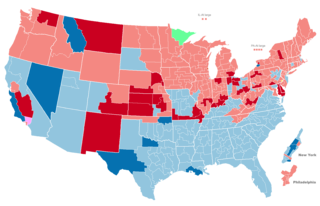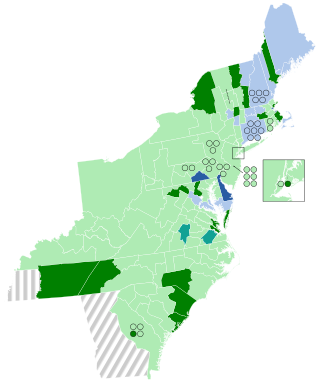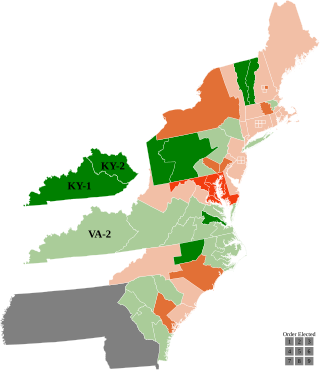A special election was held in Georgia's at-large congressional district on October 3, 1803 to fill a vacancy caused by the resignation, before the start of the 8th Congress, of John Milledge (DR), who had been elected Governor of Georgia.
| Elections in Georgia |
|---|
 |
A special election was held in Georgia's at-large congressional district on October 3, 1803 to fill a vacancy caused by the resignation, before the start of the 8th Congress, of John Milledge (DR), who had been elected Governor of Georgia.
| Candidate | Party | Votes [1] | Percent |
|---|---|---|---|
| Joseph Bryan | Democratic-Republican | 8,102 | 71.3% |
| Matthew MacAlister | Federalist | 2,230 | 19.6% |
| Cowles Mead | Democratic-Republican | 1,039 | 9.1% |
Bryan took his seat with the rest of the 8th Congress at the start of the 1st session.

The 1996 United States House of Representatives elections was an election for the United States House of Representatives on November 5, 1996, to elect members to serve in the 105th United States Congress. They coincided with the re-election of President Bill Clinton. Democrats won the popular vote by almost 60,000 votes (0.07%) and gained a net of two seats from the Republicans, but the Republicans retained an overall majority of seats in the House for the first time since 1928.

The 1966 United States House of Representatives elections was an election for the United States House of Representatives on November 8, 1966, to elect members to serve in the 90th United States Congress. They occurred in the middle of President Lyndon B. Johnson's second term. As the Vietnam War continued to escalate and race riots exploded in cities across the country, Johnson's popularity had fallen, and the opposition Republican Party was able to gain a net of 47 seats from Johnson's Democratic Party, which nonetheless maintained a clear majority in the House. This was also the first election that occurred after the Voting Rights Act of 1965 became law, the first time since 1870 that a Republican won a House seat in Arkansas, and the first since 1876 that the party did so in South Carolina.

The 1964 United States House of Representatives elections was an election for the United States House of Representatives on November 3, 1964, to elect members to serve in the 89th United States Congress. They coincided with the election to a full term of President Lyndon B. Johnson. Johnson's landslide victory over Barry Goldwater allowed his Democratic Party to gain a net of 36 seats from the Republican Party, giving them a two-thirds majority in the House. The election also marked the first time since Reconstruction that Republicans made inroads in the Deep South, with Republicans winning seats in Georgia for the first time since 1874, and Alabama and Mississippi since 1876.

The 1958 United States House of Representatives elections was an election for the United States House of Representatives to elect members to serve in the 86th United States Congress. They were held for the most part on November 4, 1958, in the middle of Dwight Eisenhower's second presidential term, while Maine held theirs on September 8. There were 436 seats during these elections: 435 from the reapportionment in accordance with the 1950 census, and one seat for Alaska, the new state that would officially join the union on January 3, 1959.

The 1932 United States House of Representatives elections were elections for the United States House of Representatives to elect members to serve in the 73rd United States Congress. They were held for the most part on November 8, 1932, while Maine held theirs on September 12. They coincided with the landslide election of President Franklin D. Roosevelt.

The 1918 United States House of Representatives elections were elections for the United States House of Representatives to elect members to serve in the 66th United States Congress. They were held for the most part on November 5, 1918, while Maine held theirs on September 9. They occurred in the middle of President Woodrow Wilson's second term.

The 1868–69 United States House of Representatives elections were held on various dates in various states between June 1, 1868, and August 2, 1869. Each state set its own date for its elections to the House of Representatives before or after the first session of the 41st United States Congress convened on March 4, 1869. They coincided with the 1868 United States presidential election, which was won by Ulysses S. Grant. Elections were held for all 243 seats, representing 37 states. All of the former Confederate states were represented in Congress for the first time since they seceded from the Union.
The 1818–19 United States House of Representatives elections were held on various dates in various states between April 26, 1818 and August 12, 1819. Each state set its own date for its elections to the House of Representatives before the first session of the 16th United States Congress convened on December 6, 1819. They occurred during President James Monroe's first term. Also, newly admitted Alabama elected its first representatives in September 1819, increasing the size of the House to 186 seats.

The 1812–13 United States House of Representatives elections were held on various dates in various states between August 3, 1812, and April 30, 1813. Each state set its own date for its elections to the House of Representatives before the first session of the 13th United States Congress convened on May 24, 1813. They coincided with James Madison being re-elected president.

The 1804–05 United States House of Representatives elections were held on various dates in various states between April 24, 1804, and August 5, 1805. Each state set its own date for its elections to the House of Representatives before the first session of the 9th United States Congress convened on December 2, 1805. The elections occurred at the same time as President Thomas Jefferson's re-election. Elections were held for all 142 seats, representing 17 states.

The 1802–03 United States House of Representatives elections were held on various dates in various states between April 26, 1802 and December 14, 1803. Each state set its own date for its elections to the House of Representatives, either before or after the first session of the 8th United States Congress convened on October 17, 1803. They occurred during President Thomas Jefferson's first term in office.

The 1800–01 United States House of Representatives elections were held on various dates in various states between April 29, 1800, and August 1, 1801. Each state set its own date for its elections to the House of Representatives before the first session of the 7th United States Congress convened on December 7, 1801. They were held at the same time as the 1800 presidential election, in which Vice President Thomas Jefferson, a Democratic Republican, defeated incumbent President John Adams, a Federalist. Elections were held for all 105 seats, representing 15 states.

The 1792–93 United States House of Representatives elections were held on various dates in various states between August 27, 1792, and September 6, 1793. Each state set its own date for its elections to the House of Representatives before the first session of the 3rd United States Congress convened on December 2, 1793. With the addition of the new state of Kentucky's representatives, and the congressional reapportionment based on the 1790 United States census, the size of the House increased to 105 seats.

The 1790–91 United States House of Representatives elections were held on various dates in various states between April 27, 1790, and October 11, 1791. Each state set its own date for its elections to the House of Representatives before or after the first session of the 2nd United States Congress convened on October 24, 1791. This was the first midterm election cycle, which took place in the middle of President George Washington's first term. The size of the House increased to 67 seats after the new state of Vermont elected its first representatives.

Elections to the United States House of Representatives were held in Pennsylvania on October 9, 1804, for the 9th Congress.

Georgia's at-large congressional district special election, 1819 was called to fill a vacancy created when the former congressman was elected to the United States Senate.

A special election was held in Georgia's at-large congressional district on March 23, 1801 to fill a vacancy left by the death of James Jones on January 11, 1801, before the start of the 7th Congress. His death had also left a vacancy in the 6th Congress, which went unfilled.

A special election was held in Georgia's 1st congressional district on October 1, 1827 to fill a vacancy left by the resignation of Edward F. Tattnall (J) prior to the start of the 20th Congress.